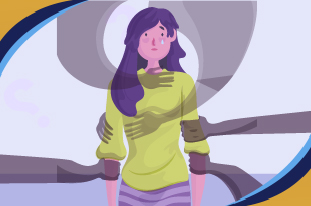Depression is a complex mental health condition that can impact a person’s life and hinder their daily working or activity. This is like despair or inactivity, or not doing anything that gives one pleasure. This means that feeling sad or losing interest in life is not a unique experience for those affected. It can affect any person regardless of age, background, or social status. It influences how people judge, think, and handle day-to-day tasks emotionally. It is not a weakness or something you can simply get over, but this is also not something you can “snap out of” positively.
Depression is a common, severe mental health disorder that has impacted millions of people worldwide. Globally, many people struggle with depression, which can make it hard for them to work, attend school, and have a good relationship. For example, almost 280 million people in the world live with depression. Here is a shocker: depression is not always noisy or visible. Some of the most successful and seemingly happy people might have been struggling with this silently. So, it comes with types and stages like the other mental disorders.
Depression, particularly Major Depressive Disorder (MDD), has different stages that range from mild sadness to severe clinical depression that requires seeing a health expert. These stages, while not a rigid scale, help to understand the development of symptoms and severity of depression.
You Understand About Depression, But You Don’t’
Depression is more than simply despair. It is a continuous mood disorder that can affect the thoughts, feelings, behavior, and physical well-being of a person.
While experiences vary from person to person, but often follow a development, which makes it helpful to recognize and for early intervention. The initial depression stages start with isolation, but recognizing patterns can help towards recovery.

Onset of Depression, The First Seeds Or Early Signs
In its earliest manifestation, depression can present in subtle shifts in a person’s usual state. These early signs can be easily ignored or overlooked as temporary stressors. However, paying close attention to these emerging changes can be decisive for early intervention.
Changes In Mood
Sadness:
In this early stage, people feel sadness or emptiness. A pervasive feeling of sadness that persists without lifting, but this feeling is distinct from typical fleeting sadness.
Anhedonia (Loss of Interest or Pleasure)
A noticeable decrease in enjoyment from activities once found pleasurable, including hobbies, social interactions, or even favorite foods, can’t help but uplift or make you happy. This can be a general disengagement from life.
Irritability Or Restlessness
For some people, it may not be in the form of sadness; rather, they feel irritability, agitation, or restlessness. There might be a low tolerance for frustration or a heightened sense of unease.
Read More: Major Depressive Disorder In Children: A Guide For Parents
Behavioral Shift
Social Withdrawal
There is a tendency to pull away from friends, family, and social gatherings, and a person prefers solitude over interaction. This can be a gradual process and leading to increased isolation.
Sleep Irregularities
This can be added with sleep disorders like staying asleep, or contrary, sleeping excessively. You can say, insomnia and hypersomnia are common indicators. Sleep is closely related to depression and Vis-à-vis.
Appetite Or Weight Changes
There is a prominent increase or decrease in appetite, which leads to unintended weight gain or loss. Eating becomes irregular, or there is a dramatic shift in appetite.
Read More: Coping Mechanisms For Depression: Practical Strategies To Help You Navigate
Cognitive Indicators
Difficulty in Concentration
People struggling with depression may find problems with focus, concentration, remembering details, and making decisions. Simple tasks feel difficult, overwhelming, and usually, people feel brain foggy.
Feelings Of Guilt Or Worthlessness
There is a pervasive sense of self-blame, inadequacy, or excessive guilt that is not all the time related to actual circumstances. These thoughts can be intrusive and distressing.
These initial indicators, while subtle, signal a potential shift in mental well-being. The recognition of these feelings opens ways for proactive steps, potentially preventing the condition from escalating.
2-Moderate Depression
As time passes, depression grips the minds. The initial signs intensify, and the effect on daily functioning becomes more pronounced. This stage often marks a significant disruption in a person’s life because it affects their work, relationships, and overall quality of life.
Deep Sadness and Despair
The feelings of sadness become more overwhelming, usually it is accompanied by a sense of hopelessness or despair. This is different from situational sadness because it is a heavy and persistent emotional state.
Increased Anhedonia
The inability to experience pleasure becomes more normal, which is extended to almost all aspects of life. Usual activities that once brought joy now feel meaningless or burdensome.
Emotional Numbness
Some individuals can experience a sense of emotional detachment or numbness, where they have difficulty experiencing any emotions, positive or negative. This can be a protective mechanism, but it further isolates the individual.
Physical Manifestations
It is common for depression to show up as a physical symptom even when there is no clear medical reason for it. People often feel a relentless sense of tiredness and have low energy, even when they get enough sleep. Simple task seems to them hard, and it is difficult to find inspiration.
This is sometimes called psychomotor retardation where a person’s physical and emotional reaction slow down. Additionally, people can experience unexplained aches and pains, such as headaches, stomach issues, or general body discomfort. These physical complaints can be how emotional distress appears in the body. Dr. David Burns notes in” Feeling Good: The New Mood Therapy” that physical symptoms and feeling depressed are often connected.
Read More: ADHD vs Depression: Finding The Link Between Them
Behavioral and Social Impairment
When someone experiences a significant downturn, they often pull away from social interactions, even avoiding those closest to them. This can make them feel more alone, which creates a difficult situation. At the same time, their work or school performance may suffer noticeably. They may struggle to meet deadlines, produce less, or find it difficult to maintain their normal standards. This can lead to problems with their job, studies, or daily tasks. Moreover, they may start to ignore their own well-being. This can be directed at not eating properly, neglecting their appearance, or missing important doctor appointments.
Cognitive Distortions
In this modern age of depression, people often experience persistent negative thoughts about themselves, the world, and what’s to come. These thoughts can involve repeatedly dwelling on problems, predicting worst-case scenarios, or focusing only on past mistakes. There can be a thought of death or a wish not to awaken from sleep, which indicates major distress even without a specific plan. The impact of these symptoms is clear, and makes professional help increasingly necessary as daily life and well-being are noticeably affected.
Read More: Is Major Depressive Disorder The Same As Bipolar Disorder?
3- The Severe Or Peak Of Depression
Severe depression represents a profound and debilitating state where the symptoms are intense and pervasive, making it extremely difficult for an individual to function in their daily life. At this stage, people need immediate and expert professional intervention for treatment.
Overwhelming Emotional Distress
The people who encounter severe depression can feel a sense of despair and desperation. It makes their life seem unbearable, empty, and without purpose. They may find themselves completely unable to experience pleasure or joy, and it seems that the world is flat and colorless. Moreover, they could be burdensome by extreme feelings of shame, worthlessness, and guilt. Sometimes, they believe they are a burden on their family or deserve to suffer.
Significant Physical Impairment
People who are struggling with a severe mood episode can show significant changes in their behavior, eating habits, and sleep patterns. They might move and speak very slowly, or instead, they might be extremely restless. Their appetite could completely disappear, which leads to rapid weight loss, or they might eat excessively and gain weight quickly. Sleep is often severely disrupted, with some people unable to sleep, and some people experience insomnia.
Reflective Functional Weakening
It can become impossible for someone to manage everyday activities such as getting out of bed, bathing, dressing, or eating without help. Fundamental self-care feels unnecessary. They might withdraw entirely from all social contact, prefer to remain inside their home or bed, and their communication may lessen or stop entirely. This can make it impossible to attend work or school, leading to loss of employment or academic failure, as they cannot function in any organized environment.
Critical Cognitive and Behavioral Concerns
When depression is severe, a person can experience false beliefs or perceive things that are not present. These imaginations and perceptions often align with themes of sadness, such as beliefs about financial ruin. Additionally, people can have recurring thoughts of self-harm, along with a specific plan. This condition needs critical medical and mental health support. In this stage, hospitalization becomes necessary for the person’s safety and well-being.
Read More: A Guide To Understand Smiling Depression
4- Remission And Relapse, The Stage Of Relapse And Recurrence
The course of depression often does not progress in a straight line. It fluctuates between relapse and recurrence. After treatment, the stages of depression, people may experience a period where their symptoms lessen greatly or vanish. Nevertheless, a return of depressive symptoms often occurs many times.
Remission
All those who have recovered from depression, remission means a big drop in how often and how strong depressive symptoms appear. People can turn to a stable and functional state. This allows them to do daily activities again, including work or hobbies, and to see friends and family. A sense of hope, pleasure, and general well-being comes back. Remission is a key part of getting better, but it is not a complete cure. It needs continued self-care, therapy, and, for some, medication for remaining in a remission state.
Relapse
While achieving remission from depression is a major step towards recovery, it does not signify a complete cure. Symptoms can return, often similar to previous experiences, which may be triggered by stress, life events, or stopping treatments. This recurrence can lead to a decline in a person’s ability to function.
However, recognizing the possibility of relapse allows individuals to prepare and manage it. Early identification of recurring symptoms and quick re-engagement with treatment can reduce the severity and length of a relapse. Mood disorders like depression often follow a cyclical pattern, which makes continuous alertness and proactive plans essential for sustained well-being. Maintaining the remission often needs ongoing self-care, therapy, and, for some, medication.
Read More: What is Endogenous Depression? Symptoms and Treatment

The solutions for Healing and Well-being
After people know about the stages of depression, it can empower them and their loved ones to recognize the signs, seek help at appropriate times, and engage in effective treatment. Depression is a treatable condition, and with the right support, recovery is possible.
Key Components of Healing
Professional support
mental health professionals like therapists, psychiatrists, and counselors can help to recover from the symptoms. They give support and therapies like Cognitive Behavioral Therapy (CBT) or Interpersonal Therapy (IPT) that can help with coping and address underlying issues. Suitable medication, when needed, can help regulate brain chemistry.
Self-Care Practices
People can help themselves to curb the symptoms. They can implement strong self-care routines like regular exercise, a balanced diet, sufficient sleep, and mindfulness practices, which can mainly contribute to mental well-being.
Social Support
Social support can build or maintain a strong social connection, which provides a necessary buffer against isolation and offers emotional support during challenging times. The connection with friends, family, and support groups can be incredibly beneficial.
Education And Awareness
The knowledge and information about the stages of depression can help people to manage their condition more effectively and reduce self-stigma. It is necessary to know that depression is a medical illness, and not a personal failing.
Patience and Persistence
The recovery from depression needs patience and time, which often requires persistence and a willingness. There will be good days after challenges, and it will pass.
Read More: Online Psychiatrists Give The Same Care as In-House Psychiatrists
Depression has different symptoms and stages, but these conditions are not necessarily the same in all people. The same intensity might be different.
Depression is curable and a healthy process, but it can be associated with negative changes to physical and mental health.
Different support groups are available here in Orange Coast Psychiatry for people with depression. We cure every different stage of depression without experienced psychiatrists, practitioners, and experts who understand the problems more often and suggest help accordingly. Our online support also offers help and resources for people with depression.


















